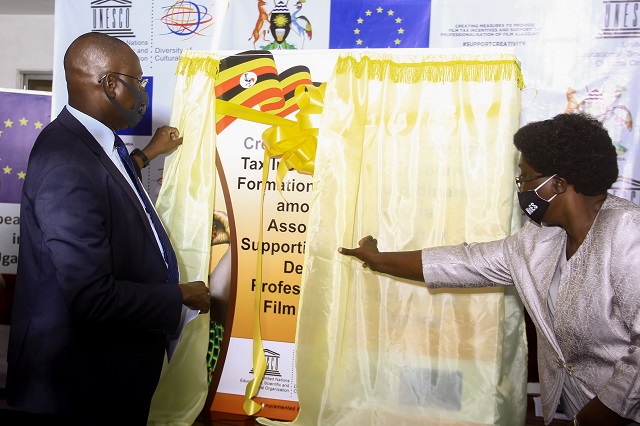
Kampala, Uganda | THE INDEPENDENT | The Government of Uganda through the Ministry of Gender, Labour and Social Development has partnered with the European Union (EU) and UNESCO in a joint project aimed at supporting the development of the local film industry.
The project will create measures to provide a tax Incentive and encourage formation of and coordination among professional associations. All this will be aimed at supporting local content development and professionalization of the film sector in Uganda.
It is a year-long project involving wide-reaching multi-stakeholder consultations culminating into the development and implementation of a number of strategic measures aimed at addressing some of the major challenges affecting Uganda’s emerging film sector.
Speaking at the project’s official launch in Kampala, the Minister for Gender, Labour and Social Development, Frank Tumwebaze, who was represented by the Acting Permanent Secretary, Mr. James Ebitu, said the project is a timely step towards achieving Government’s plans for the culture and creative sub-sector following its prioritisation as a major driver for economic development in the 2020/21-2024/25 Third National Development Plan (NDPIII) and the Second Social Development Sector Plan, 2020/21-2024/25.
He explained that the project will complement other existing Government policies and initiatives geared towards the building of a strong domestic film industry that will solve Uganda’s youth unemployment problem, earn the country millions of dollars in foreign exchange and spearhead the shaping of local content and national identity.
“This cannot be possible if the regulatory framework is weak and fragmented; at the same time, Film stakeholders must be professional and coordinated, which critical gap the project aims to fill.” The Minister said.
According to the 2020 Uganda National Culture Policy Regulatory Assessment Report, despite its ability to employ more youth than any other sub-sector in the economy, the local film industry is still plagued by a number of challenges including lack of access to funding, high levels of piracy and limited capacity amongst filmmakers.
According to the project’s Focal Person who is also the Commissioner, Culture and Family Affairs at the Ministry of Gender, Labour and Social Development, Naumo Juliana Akoryo, a National Team composed of 30 representatives of various Film Guilds and Ministries, Department and Agencies has been set up. She said a work plan has also been crafted to ensure that all these challenges are addressed under the project.
Speaking at the project launch, Anna Merrifield, the European Union Delegation Chargé d’Affaires a.i., stressed the importance of ensuring that “legislation and policy reform of the film industry guarantee freedom of expression and room for independent film makers.”
The Secretary General of Uganda National Commission for UNESCO, Rosie Agoi, noted that the Cultural Diversity Convention has four main goals, which aim to incorporate culture into national development plans, ensure a balanced flow of cultural goods and services and promote the mobility of artists and cultural professionals around the world.
“In other words, we need to ensure we have Ugandan films at the theatre, Ugandan music on the radio, Ugandan books in the library, Ugandan art in the museums, and so on—and we also need to ensure we have a diversity of cultural goods from other countries.” She said.
Project background
The Ugandan project is part of a bigger ongoing UNESCO program funded by the European Union: The EU/UNESCO Expert Facility on the Governance of Culture in Developing Countries: Support for new regulatory frameworks to strengthen the cultural and creative industries and promote South-South cooperation. Through an overall budget of EUR 3.2 Mio, the program seeks to support 25 developing countries, which are Parties to the UNESCO 2005 Convention on the Protection and Promotion of the Diversity of Cultural Expression.
Ratified by Uganda in 2015, the Convention recognises the right of Governments to create an enabling environment for the development of dynamic cultural and creative industries by adopting progressive regulatory frameworks.
Following a preliminary research by the project’s team of experts, a number of interventions have been suggested for further development during the project. These include; the establishment of a national film fund, consolidation of film regulation under one State Agency and establishment of a tax rebates/cash system and promotion of equity investment in film among other measures. These measures will be further scrutinised and developed in consultation with various industry experts, practitioners and stakeholders during the project before they can be adopted and implemented by Government.
 The Independent Uganda: You get the Truth we Pay the Price
The Independent Uganda: You get the Truth we Pay the Price



